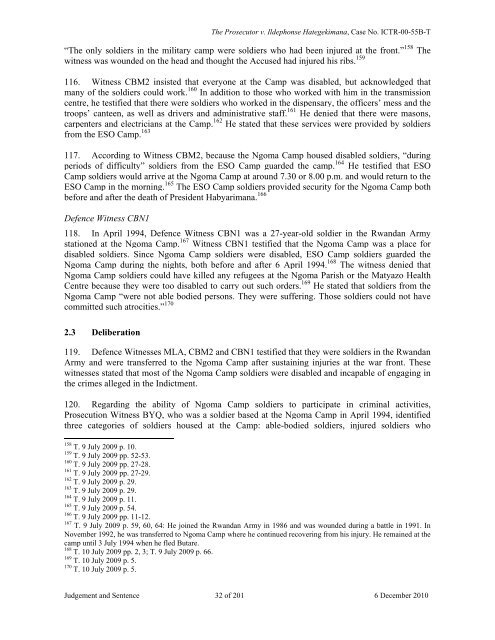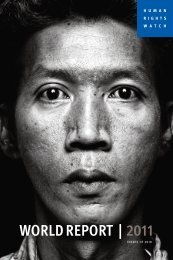Hategekimana - JUDGEMENT & SENTENCE - Refworld
Hategekimana - JUDGEMENT & SENTENCE - Refworld
Hategekimana - JUDGEMENT & SENTENCE - Refworld
You also want an ePaper? Increase the reach of your titles
YUMPU automatically turns print PDFs into web optimized ePapers that Google loves.
The Prosecutor v. Ildephonse <strong>Hategekimana</strong>, Case No. ICTR-00-55B-T<br />
“The only soldiers in the military camp were soldiers who had been injured at the front.” 158 The<br />
witness was wounded on the head and thought the Accused had injured his ribs. 159<br />
116. Witness CBM2 insisted that everyone at the Camp was disabled, but acknowledged that<br />
many of the soldiers could work. 160 In addition to those who worked with him in the transmission<br />
centre, he testified that there were soldiers who worked in the dispensary, the officers’ mess and the<br />
troops’ canteen, as well as drivers and administrative staff. 161 He denied that there were masons,<br />
carpenters and electricians at the Camp. 162 He stated that these services were provided by soldiers<br />
from the ESO Camp. 163<br />
117. According to Witness CBM2, because the Ngoma Camp housed disabled soldiers, “during<br />
periods of difficulty” soldiers from the ESO Camp guarded the camp. 164 He testified that ESO<br />
Camp soldiers would arrive at the Ngoma Camp at around 7.30 or 8.00 p.m. and would return to the<br />
ESO Camp in the morning. 165 The ESO Camp soldiers provided security for the Ngoma Camp both<br />
before and after the death of President Habyarimana. 166<br />
Defence Witness CBN1<br />
118. In April 1994, Defence Witness CBN1 was a 27-year-old soldier in the Rwandan Army<br />
stationed at the Ngoma Camp. 167 Witness CBN1 testified that the Ngoma Camp was a place for<br />
disabled soldiers. Since Ngoma Camp soldiers were disabled, ESO Camp soldiers guarded the<br />
Ngoma Camp during the nights, both before and after 6 April 1994. 168 The witness denied that<br />
Ngoma Camp soldiers could have killed any refugees at the Ngoma Parish or the Matyazo Health<br />
Centre because they were too disabled to carry out such orders. 169 He stated that soldiers from the<br />
Ngoma Camp “were not able bodied persons. They were suffering. Those soldiers could not have<br />
committed such atrocities.” 170<br />
2.3 Deliberation<br />
119. Defence Witnesses MLA, CBM2 and CBN1 testified that they were soldiers in the Rwandan<br />
Army and were transferred to the Ngoma Camp after sustaining injuries at the war front. These<br />
witnesses stated that most of the Ngoma Camp soldiers were disabled and incapable of engaging in<br />
the crimes alleged in the Indictment.<br />
120. Regarding the ability of Ngoma Camp soldiers to participate in criminal activities,<br />
Prosecution Witness BYQ, who was a soldier based at the Ngoma Camp in April 1994, identified<br />
three categories of soldiers housed at the Camp: able-bodied soldiers, injured soldiers who<br />
158 T. 9 July 2009 p. 10.<br />
159 T. 9 July 2009 pp. 52-53.<br />
160 T. 9 July 2009 pp. 27-28.<br />
161 T. 9 July 2009 pp. 27-29.<br />
162 T. 9 July 2009 p. 29.<br />
163 T. 9 July 2009 p. 29.<br />
164 T. 9 July 2009 p. 11.<br />
165 T. 9 July 2009 p. 54.<br />
166 T. 9 July 2009 pp. 11-12.<br />
167 T. 9 July 2009 p. 59, 60, 64: He joined the Rwandan Army in 1986 and was wounded during a battle in 1991. In<br />
November 1992, he was transferred to Ngoma Camp where he continued recovering from his injury. He remained at the<br />
camp until 3 July 1994 when he fled Butare.<br />
168 T. 10 July 2009 pp. 2, 3; T. 9 July 2009 p. 66.<br />
169 T. 10 July 2009 p. 5.<br />
170 T. 10 July 2009 p. 5.<br />
Judgement and Sentence 32 of 201 6 December 2010

















